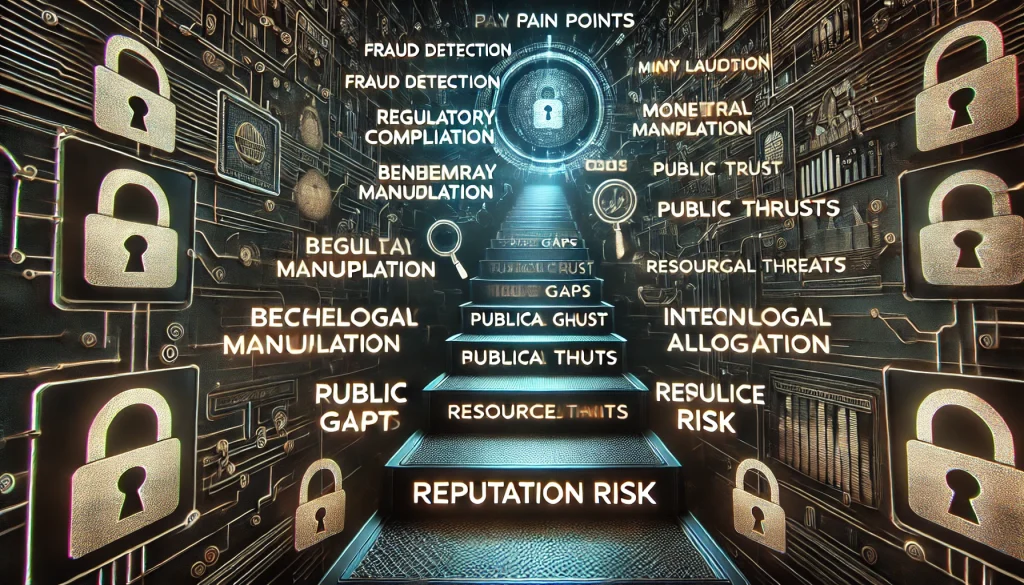Problem Statement
The financial sector is crucial for economic stability and growth. However, it has been plagued by unethical practices such as fraud, money laundering, and the manipulation of financial benchmarks. These activities undermine public trust, distort markets, and can cause significant economic and social harm. Fraud involves deceitful practices for financial gain, leading to financial losses for individuals and institutions. Money laundering allows the integration of illicit funds into the legitimate economy, facilitating further criminal activities. Manipulation of financial benchmarks, such as LIBOR, skews interest rates and undermines market integrity. Addressing these issues requires comprehensive strategies involving stricter regulations, advanced monitoring technologies, and a commitment to ethical practices.
Pain Points
- Fraud Detection: Difficulty in identifying and preventing fraudulent activities.
- Regulatory Compliance: Complex and evolving regulations require constant updates and compliance efforts.
- Money Laundering: Sophisticated schemes that are hard to trace and prosecute.
- Benchmark Manipulation: Distortion of financial benchmarks affecting global markets.
- Public Trust: Loss of confidence in financial institutions due to unethical practices.
- Technological Gaps: Lack of advanced tools to monitor and prevent unethical practices.
- Interconnectedness: Global financial systems’ complexity increases vulnerability to unethical practices.
- Insider Threats: Employees with access to sensitive information committing unethical acts.
- Resource Allocation: High costs and resources required for monitoring and compliance.
- Reputation Risk: Long-term damage to brand and reputation due to unethical behavior.

Future Vision
The future vision for addressing ethical issues in the financial sector involves creating a transparent, accountable, and technologically advanced system. This vision includes the development of robust regulatory frameworks, real-time monitoring systems using AI and machine learning, and enhanced cooperation between international regulatory bodies. Financial institutions will adopt comprehensive compliance programs, prioritize ethical training for employees, and leverage blockchain technology for secure and transparent transactions. By fostering a culture of integrity and accountability, the financial sector can rebuild public trust and ensure long-term stability and growth.
Use Cases
- AI-Powered Fraud Detection: Implementing AI to identify and prevent fraudulent activities in real-time.
- Blockchain for Transparency: Using blockchain to enhance transparency and traceability of financial transactions.
- Automated Compliance Systems: Developing tools for real-time regulatory compliance.
- Enhanced Due Diligence: Using advanced analytics for thorough background checks and monitoring.
- Real-Time Benchmark Monitoring: AI systems to monitor and prevent benchmark manipulation.
- Public Trust Campaigns: Initiatives to restore and maintain public confidence in financial institutions.
- Cross-Border Collaboration: International cooperation to combat money laundering and fraud.
- Employee Ethics Training: Comprehensive training programs focusing on ethical behavior and compliance.
- Advanced KYC Solutions: Implementing cutting-edge Know Your Customer (KYC) technologies.
- Cybersecurity Enhancements: Strengthening cybersecurity measures to protect against insider threats.
Target Users and Stakeholders
- User: Financial regulators
- Age group: 30-60 years
- Gender: M/F
- Usage Pattern: Continuous monitoring and regulation of financial entities.
- Benefit: Improved regulatory oversight and financial stability.
- User: Financial institutions
- Age group: 25-60 years
- Gender: M/F
- Usage Pattern: Implementation of compliance and monitoring tools.
- Benefit: Enhanced reputation and reduced risk of unethical practices.
- User: General public
- Age group: 18-65 years
- Gender: M/F
- Usage Pattern: Interactions with financial institutions for various services.
- Benefit: Increased trust and security in financial transactions.
Key Competition
- Competitors: Major financial regulatory bodies (e.g., SEC, FCA), established financial institutions, and fintech companies.
- Description: These entities are actively involved in regulating, monitoring, and offering innovative solutions to manage and prevent unethical practices in the financial sector. They focus on enhancing transparency, improving risk management practices, and ensuring compliance with regulatory standards.
Products/Services
- Regulatory Technology (RegTech): Solutions for automated compliance and regulatory reporting.
- Fraud Detection Software: Tools for real-time fraud detection and prevention.
- Blockchain Solutions: Platforms for enhancing transparency and traceability of financial transactions.
- AI-Based Analytics: Advanced analytics for risk assessment, compliance, and market intelligence.
- Cybersecurity Solutions: Advanced measures to protect against fraud and insider threats.
- KYC Solutions: Tools for efficient and accurate customer verification processes.
- Employee Training Programs: Comprehensive training on ethics and compliance.
- Public Trust Campaigns: Initiatives to restore and maintain public confidence in financial institutions.
Active Startups
- Chainalysis: Provides blockchain analytics and compliance solutions.
- Elliptic: Offers risk management and regulatory compliance for digital assets.
- ComplyAdvantage: Uses AI for real-time financial crime detection and compliance.
- Trulioo: Provides identity verification solutions for regulatory compliance.
- Onfido: Specializes in AI-based identity verification and fraud detection.
- Behavox: Uses AI to monitor and analyze behavior for compliance and risk management.
- OpenFin: Offers an operating system for financial services to enhance interoperability and efficiency.
- SentinelOne: Focuses on AI-driven cybersecurity for financial institutions.
- EverCompliant: Provides solutions to prevent transaction laundering.
- Forter: Specializes in fraud prevention and customer authentication.
Ongoing Work in Related Areas
- Financial Stability Board (FSB): Research and guidelines on mitigating unethical practices in the financial sector.
- Basel Committee on Banking Supervision (BCBS): Developing frameworks for regulatory oversight and compliance.
- International Organization of Securities Commissions (IOSCO): Standards for securities regulation and ethical practices.
- Financial Conduct Authority (FCA): Innovation initiatives and regulatory sandboxes for fintech.
- European Banking Authority (EBA): Guidelines for risk management, transparency, and ethical practices.
Recent Investment
- Chainalysis: Raised $100 million in Series E funding in June 2021 to expand its compliance solutions.
- ComplyAdvantage: Raised $50 million in Series C funding in July 2021 to develop its AI-driven compliance platform.
- Trulioo: Secured $394 million in Series D funding in June 2021 for its identity verification solutions.
- Onfido: Received $100 million in Series D funding in April 2020 to enhance its AI-based fraud detection.
- Forter: Raised $125 million in Series E funding in May 2021 for its fraud prevention solutions.
Market Maturity
The market for managing and preventing unethical practices in the financial sector is rapidly evolving. With increasing regulatory scrutiny and the adoption of advanced technologies, financial institutions are becoming more equipped to combat fraud, money laundering, and benchmark manipulation. The rise of RegTech and AI-based solutions has significantly improved the ability to monitor, detect, and prevent unethical activities in real-time. However, the market is still maturing, with ongoing efforts required to enhance international cooperation, standardize regulatory frameworks, and foster a culture of ethical behavior within financial institutions. Continuous innovation and investment in this area are essential to achieve a fully mature and resilient financial system.
Summary
The financial sector is facing significant ethical challenges, including fraud, money laundering, and manipulation of financial benchmarks. These unethical practices undermine public trust and can lead to severe economic and social consequences. Addressing these issues requires a multifaceted approach involving stricter regulations, advanced monitoring technologies, and a commitment to ethical practices. The future vision for the financial sector includes developing robust regulatory frameworks, leveraging AI and blockchain for real-time monitoring and compliance, and fostering international cooperation. Key stakeholders such as financial regulators, institutions, and the general public stand to benefit from enhanced transparency, accountability, and stability. The competitive landscape includes major regulatory bodies, established financial institutions, and innovative startups offering solutions in RegTech, fraud detection, and compliance. The market for managing unethical practices is evolving, with significant investments in AI-driven and blockchain solutions. However, achieving a fully mature market will require ongoing efforts to enhance cooperation, standardize regulations, and promote ethical behavior across the financial sector.



